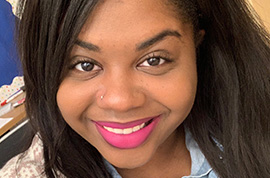


Role: Teacher
School: KIPP Lanning Square Primary
What inspired you to become a teacher?
As a child, I moved between the Bronx and Trenton before attending high school in Lawrence, New Jersey. I remember being struck by the difference in the quality of instruction between my high school in suburban Lawrence and what I encountered in Trenton and the Bronx. My high school teacher Ms. Stollwerk inspired me to become a teacher by the way she supported me as a student. She encouraged my classmates and I to take Advanced Placement Courses, met with us at Starbucks for tutoring and talks, and helped me to study for difficult AP tests when I didn’t have much academic support at home.
In college, I applied for Teach For America and was placed in Bridgeport, Connecticut at Achievement First. I loved being able to connect with students who looked like me—and it felt very rewarding to be able to give back to the community.
What brought you to KIPP New Jersey? What’s unique about our approach to education?
I enjoyed teaching—but I knew I needed to do it in a place where academics were not the only thing that mattered when it came to evaluating a student’s progress. I wanted an environment where student’s social-emotional health and happiness were a priority. I also knew I loved the collaboration and support that existed at many charter schools, so I was happy to discover KIPP was in Camden.
I fell in love with KIPP New Jersey on the day of the interview. Walking around KIPP Lanning Square Primary, I saw teachers who were happy and bouncing ideas off each other. Not only were teachers happy—but students were happy! I found quickly that student progress wasn’t just about academics, but also whether they were a good citizen or a good friend. Students were praised and shouted out for demonstrating those abilities. Today, I try to marry academics with personal growth in the classroom. Not every child is a straight-A student every day, but every child can grow as a person—which impacts their whole life.
What does engagement look like in your classroom? What does it look like in the virtual classroom?
Engagement involves deep exploration of literature! From books about the Titanic, to books about sharks, I enjoy opening my third grader’s eyes to new topics. That includes difficult and important topics like social justice. Every year, we read When Marian Sang, about the famous singer Marian Anderson who encountered racism at every step of her musical career. We actually do socratic seminars and relate her story to the ongoing racial inequities in society today. I’m always blown away by their insights. It opens my eyes to know that kids pay more attention to racism than we think—and they’re capable of very high-level thinking.
I think students are the most engaged whenever you’re your true self as a teacher—whether that’s in the classroom or during virtual learning. I’m silly—I like to laugh in front of my kids and create a safe space for them to learn. Virtual learning involved a lot of check-in calls with family to make sure they were healthy and had what they needed for academic support. We kept our class connected through virtual scavenger hunts (“find something fluffy in your house!”), Fornite games, and countless phone calls with students. We had a lot of positive feedback from families. I think they appreciate us that much more now that they know how hard it can be to teach at home!
What role has professional development at KIPP New Jersey played in your growth as a teacher?
Professional development is really important here. My manager Ken observes my teaching multiple times a week, he’s always in my classroom. In addition to my one-on one coaches like Ken, we come together as an ELA team regularly to go over our lessons together and bounce ideas off of one another. Even during COVID-19, my manager still looks at data from my class and asks what I need support with. There’s a lot of empathy at KIPP NJ—your coaches want you to do better and be happy in your role.